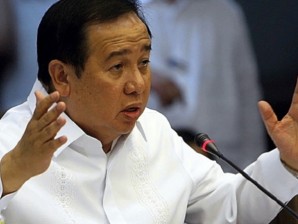Gordon opposes bill banning political dynasties

Former senator Richard “Dick” Gordon. INQUIRER FILE PHOTO
MANILA, Philippines—Barring a member of a political clan from running for electoral office would be a violation of that person’s rights, according to senatorial candidate Richard Gordon.
Gordon, who is running under the United Nationalist Alliance (UNA), said there could be another definition of a political dynasty aside from the widely accepted one, which simply referred to a politically dominant family or clan.
The issue of political dynasties has become a contentious one in this current election campaign because the senatorial race is dominated by candidates belonging to influential, politically entrenched clans, putting other potentially more capable candidates at a disadvantage.
Those who would want to put an end to this cite the constitutional provision banning political dynasties. However, the Constitution has left it to Congress to come up with the implementing law.
Gordon, a lawyer, said it would not be correct to prevent someone from seeking an elective post on the basis of his or her last name or relatives already in government.
“It is a violation of an individual’s rights not to be allowed to run,” he said during a recent dinner with INQUIRER editors and reporters.
In the final analysis, the people would choose the country’s leaders, he said, noting that there have been dynasties “felled by the ballot.”
Gordon said the people, before anything else, must be educated on what would be good for the country, and media would have a role to play in educating voters, he said.
According to Gordon, the term political dynasty refers to something far more sinister than simply being a member of a family of politicians.
“A political dynasty is one where, in effect, you impose your will either by violence or by intimidation and you get yourself elected,” he said.
In any case, this could be how Congress might define the bill, he said.
The 1987 Constitution expressly prohibits political dynasties, but it says that Congress has the task of defining what these are. It states: “The State shall guarantee equal access to opportunities for public service and prohibit political dynasties as may be defined by law.”
None of the subsequent congresses after 1987, which were all populated by political dynasts, has seen fit to define the term or pass an enabling law.
Gordon expressed opposition to the constitutional provision imposing term limits on public officials as it has resulted in competent officials bowing out of office too soon.
“The people are the term limits. That’s the essence of a democracy,” he said.
Gordon, a member of the 1971 constitutional convention, said he had actually campaigned against the 1987 “Cory Constitution”—promulgated by the revolutionary government of President Corazon Aquino following the first Edsa People Power Revolution of 1986— because he thought it was too “short-sighted.”
“And we’re paying for it,” he said.
He expressed support for Charter change, but said any such move must be guided by a clear agenda. The amendments must also be listed, similar to that of the United States Constitution, which has had 27 amendments, he said.
This would make it easier for people to understand, he said.
Charter change has been a highly charged issue in the country, with the term limits one of the contentious points.
There are fears that sitting officials would use the the amendments process as means to perpetuate their hold on power by removing the provision on term limits.